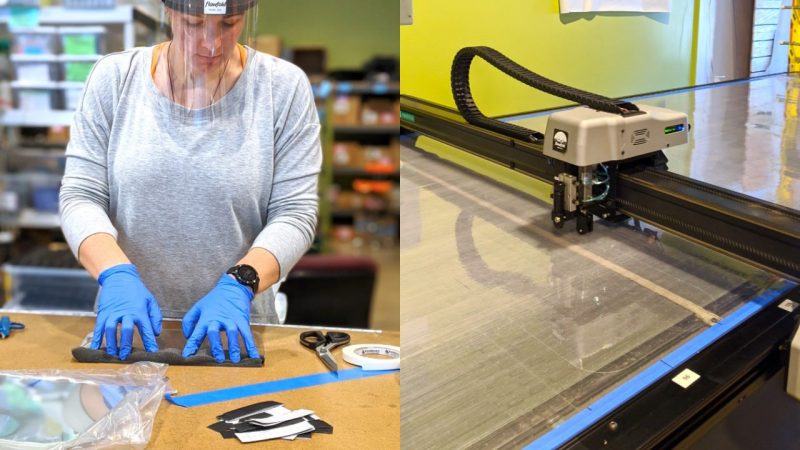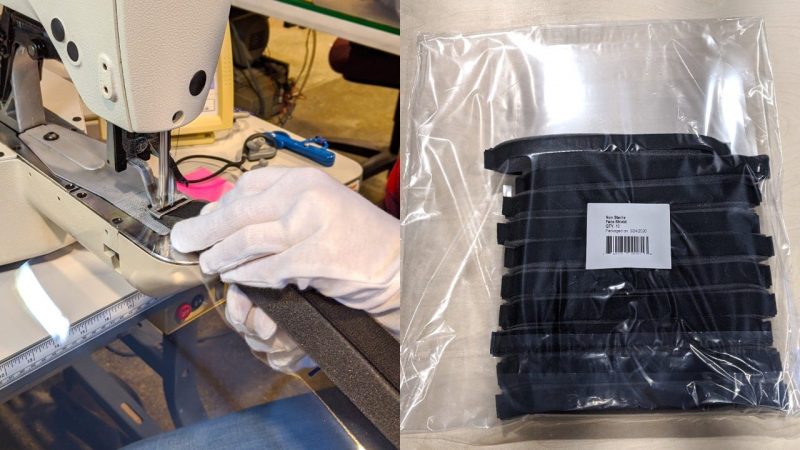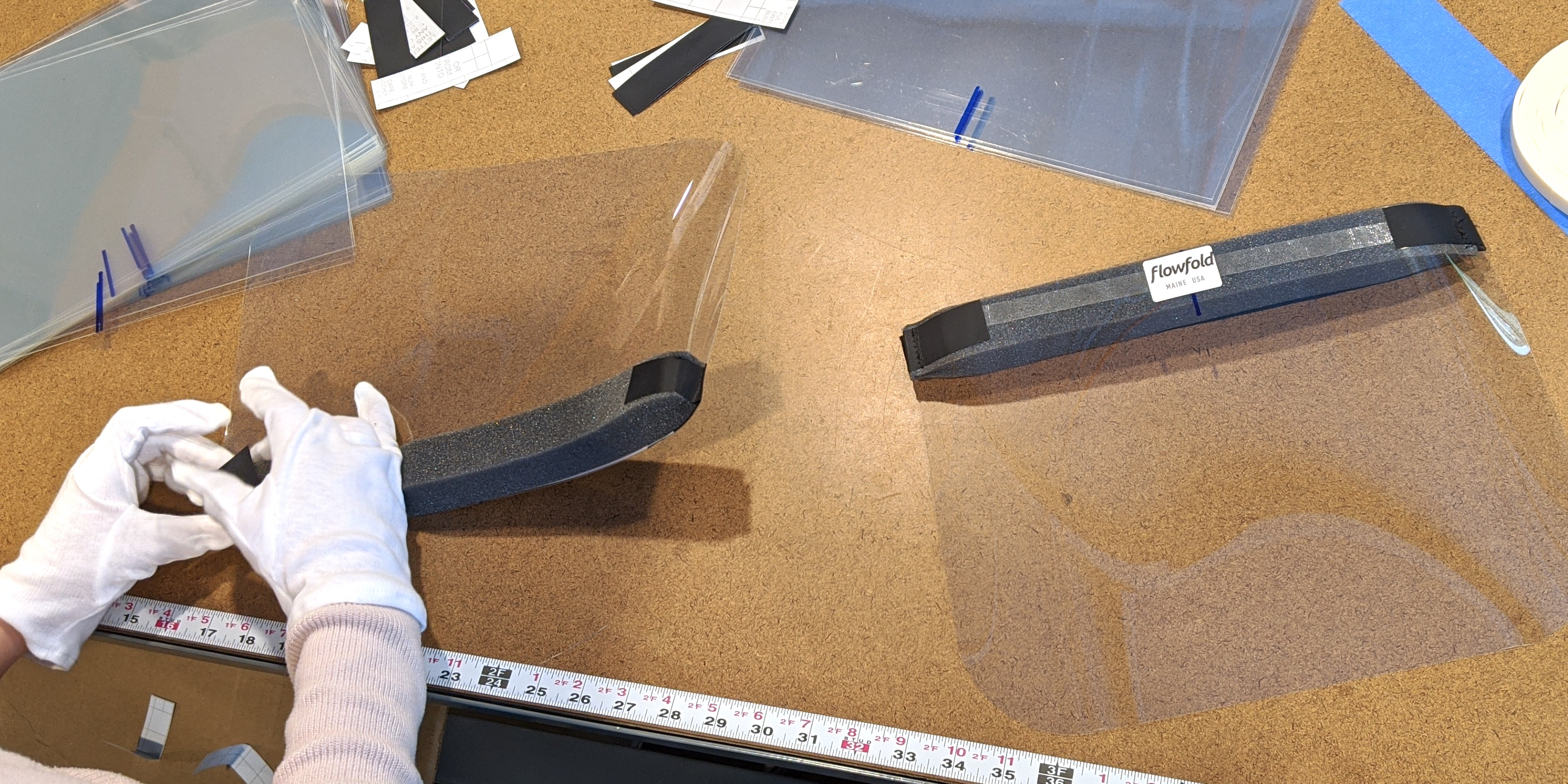- A Maine company that creates outdoor gear has become one of many US factories to pivot to producing urgently needed personal protective equipment for healthcare workers.
- Flowfold, which is best known for its wallets made of recycled sailcloth, is now producing thousands of face shields per day for doctors and nurses.
- James Morin, the co-owner and COO, told Business Insider the pivot occurred in three stages: shifting to follow health and safety standards, implementing a new workflow and learning how to make the products, and sorting out legal and insurance issues.
- Morin said the key to successfully pivoting a factory to PPE products is for companies to figure out what they excel at, and how they can adapt those skills.
- Visit Business Insider’s homepage for more stories.
The Maine-based company Flowfold got its start roughly a decade ago, when its three co-founders started selling wallets out of a car trunk for beer money.
Now, they’re one of the many small and large American companies that have pivoted entire factories to producing vital medical supplies and personal protective equipment in the fight against the novel coronavirus.
The company, which created outdoor gear sold in major retailers like L.L. Bean, REI, and Urban Outfitters, is best known for making lightweight wallets, backpacks, and totes out of recycled sailcloth.
Since Flowfold is a small business that already used domestic sources for most of its raw materials, it only took eight days between contacting MaineHealth about a potential order and starting production on its first batch of PPE, co-owner and chief operating officer James Morin told Business Insider.
"The benefit of being domestic, the benefit of being made-in-America right now, is around agility and speed like that," he said. "So we weren't relying on international vendors who couldn't ship right now or couldn't work in manufacturing sites right now."
The company's factory now consists of eight employees churning out hundreds of face shields per day for their state's hospitals and health care facilities. Doctors and nurses wear the shields as a second layer of protection over their face masks.
First comes the 'COVID pivot' to protect workers, then comes the product pivot
Morin said the process of converting the factory to produce the face shields occurred in three major phases. First came what Morin called the "general COVID pivot" to ensure the factory floor met new health and safety guidelines from medical experts.
That involved spacing all sewing machines at least six feet apart from one another, providing workers with protective items like gloves, and creating a cleaning schedule to disinfect surfaces that get touched regularly.
Secondly, the company had to figure out a workflow and how it would make an entirely new product line - with no outside help or guidance.
"Everything is a little bit different," Morin said. "The materials you're using are different than what you're used to, the process to make this is different, you have to set up new training process procedures."

That involved some trial and error, Morin said. For instance, the factory was only able to make 250 face shields per day in the beginning - now, they're nearing their goal of producing 5,000 to 10,000 per day.
Morin said a major challenge was learning how to create the products without any official instructions or assistance from experts or more experienced manufacturers. Instead, the company sought out feedback directly from the hospitals and frontline health care workers to figure out how the products fit and feel.
"Unfortunately, for better or worse, PPE is manufactured overseas. There's just not that many people that have that level of knowledge domestically that can support makers like Flowfold," Morin said. "Normally these things will get vetted over months and you'll go through FDA approval. We don't have that luxury."
Lastly, there was the "legal stuff," which Morin acknowledged may be a higher priority for larger companies. He said Flowfold had to get new insurance and work with lawyers to draft up fine print on the new products. Morin said state officials are also working with the company on liability protections while Flowfold is manufacturing essential products.
Factories need to figure out what they do well, and how their skills can easily be applied
Morin said the key to successfully pivoting a factory like his is for owners to figure out what they excel at, and how they can adapt those skills.
He said he and his co-owners realized that face shields were a relatively easy product for them to pivot to, but that they would struggle when it came to creating apparel. So they partnered with another Maine company called American Roots - which usually specializes in fleece products - to create gowns, masks, and shoe covers.
"Flowfold did face shields because we have a pretty technical manufacturing site with very precise machinery that can cut out the face shields," Morin said. "We're used to using material like that because we use a lot of sailcloth and high-tech materials. We aren't good at making wearables."

That sort of savvy thinking is a good example for other companies to follow in the coming weeks and months as they pivot to PPE, according to Nick Vyas, an expert in supply chains and an assistant professor at the University of Southern California.
Though the marketplace for PPE has been inundated with local governments and hospitals bidding against each other, Vyas said one thing companies can do to cut out the noise is to focus on the hospitals and other customers within a 150- to 250-mile radius whose needs are the greatest.
"Make sure that they build the product, the PPE, up to standards," he said. "Follow the standards, and work within the local market they have access to."
Do you own or work in a factory that has pivoted to produce PPE, ventilators, or other essential products? Reach out to the author to share your story at [email protected].

